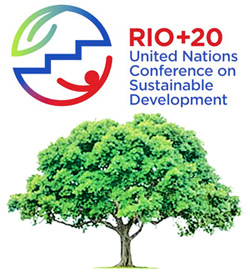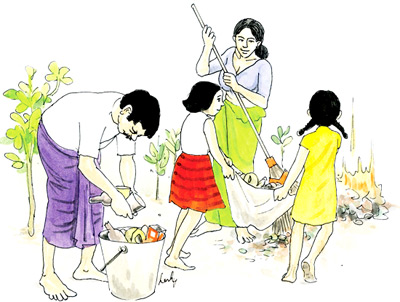|
'Poverty eradication - greatest global challenge' -
Part VIII:
Sustainable use of biodiversity and its components
Text of the final declaration issued by the
world community at the conclusion of the Rio+20 Sustainable Development
Summit recently in Rio de Janeiro, Brazil
Our Common Vision
|

People struggling against flood waters. File photo
|
200. We welcome the Strategy for Resource Mobilization in support of
the achievement of the Convention on Biological Diversity's three
objectives, including the commitment to substantially increasing
resources from all sources in support of biodiversity, in accordance
with decisions taken at the Tenth Conference of the Parties.
201. We support mainstreaming the consideration of the socio-economic
impacts and benefits of the conservation and sustainable use of
biodiversity and its components, as well as ecosystems that provide
essential services, into relevant programmes and policies at all levels,
in accordance with national legislation, circumstances and priorities.
We encourage investments, through appropriate incentives and policies,
which support the conservation and sustainable use of biological
diversity and restoration of degraded ecosystems, consistent and in
harmony with the Convention and other relevant international
obligations.
202. We agree to promote international cooperation, and partnerships,
as appropriate, and information exchange, and in this context we welcome
the United Nations Decade on Biodiversity 2011-2020 for the purpose of
encouraging active involvement of all stakeholders in the conservation
and sustainable use of biodiversity, as well as access to and the fair
and equitable sharing of benefits arising from the utilization of
genetic resources, with the vision of living in harmony with nature.
 203. We recognize the important role of CITES (the Convention on
International Trade in Endangered Species of Wild Fauna and Flora), an
international agreement that stands at the intersection between trade,
environment and development; promotes the conservation and sustainable
use of biodiversity; should contribute to tangible benefits for local
people; and ensures that no species entering into international trade is
threatened with extinction. We recognize the economic, social and
environmental impacts of illicit trafficking in wildlife where firm and
strengthened action needs to be taken on both the supply and demand
sides. In this regard, we emphasize the importance of effective
international cooperation among relevant multilateral environmental
agreements and international organizations. We further stress the
importance of basing the listing of species on agreed criteria. 203. We recognize the important role of CITES (the Convention on
International Trade in Endangered Species of Wild Fauna and Flora), an
international agreement that stands at the intersection between trade,
environment and development; promotes the conservation and sustainable
use of biodiversity; should contribute to tangible benefits for local
people; and ensures that no species entering into international trade is
threatened with extinction. We recognize the economic, social and
environmental impacts of illicit trafficking in wildlife where firm and
strengthened action needs to be taken on both the supply and demand
sides. In this regard, we emphasize the importance of effective
international cooperation among relevant multilateral environmental
agreements and international organizations. We further stress the
importance of basing the listing of species on agreed criteria.
204. We take note of the establishment of the Intergovernmental
Science-Policy Platform on Biodiversity and Ecosystem Services, and
invite an early commencement of its work, in order to provide the best
available policy-relevant information on biodiversity to assist
decision-makers.
Desertification, land degradation and drought
205. We recognize the economic and social significance of good land
management, including soil, particularly its contribution to economic
growth, biodiversity, sustainable agriculture and food security,
eradicating poverty, women’s empowerment, addressing climate change and
improving water availability. We stress that desertification, land
degradation, and drought are challenges of a global dimension and
continue to pose serious challenges to the sustainable development of
all countries, in particular developing countries. We also stress the
particular challenges this poses for Africa, and LDCs and LLDCs. In this
regard, we express deep concern for the devastating consequences of
cyclical drought and famine in Africa, in particular in the Horn of
Africa and the Sahel region, and call for urgent action through short,
medium and long-term measures at all levels.
206. We recognize the need for urgent action to reverse land
degradation. In view of this we will strive to achieve a land
degradation neutral world in the context of sustainable development.
This should act to catalyze financial resources from a range of public
and private sources.
207. We reaffirm our resolve under the United Nations Convention to
Combat Desertification (UNCCD) to take coordinated action nationally,
regionally and internationally, to monitor, globally, land degradation
and restore degraded lands in arid, semi-arid and dry sub humid areas.
We resolve to support and strengthen the implementation of the UNCCD and
its 10-Year Strategic Plan and Framework (2008-2018), including through
mobilizing adequate, predictable and timely financial resources. We note
the importance of mitigating the effects of desertification, land
degradation and drought, including by preserving and developing oases,
restoring degraded lands, improving soil quality and improving water
management, in order to contribute to sustainable development and
poverty eradication. In this regard, we encourage and recognize the
importance of partnerships and initiatives for the safeguarding of land
resources. We also encourage capacity building, extension training
programmes, and scientific studies and initiatives aimed at deepening
understanding and raising awareness of the economic, social and
environmental benefits of sustainable land management policies and
practices.
 208. We stress the importance of the further development and
implementation of scientifically based, sound and socially inclusive
methods and indicators for monitoring and assessing the extent of
desertification, land degradation and drought, as well as the importance
of efforts underway to promote scientific research and strengthen the
scientific base of activities to address desertification and drought
under the UNCCD. In this respect, we take note of the decision of the
COP10 of the UNCCD to establish an ad hoc Working Group, taking into
account regional balance, to discuss specific options for the provision
of scientific advice to its parties. 208. We stress the importance of the further development and
implementation of scientifically based, sound and socially inclusive
methods and indicators for monitoring and assessing the extent of
desertification, land degradation and drought, as well as the importance
of efforts underway to promote scientific research and strengthen the
scientific base of activities to address desertification and drought
under the UNCCD. In this respect, we take note of the decision of the
COP10 of the UNCCD to establish an ad hoc Working Group, taking into
account regional balance, to discuss specific options for the provision
of scientific advice to its parties.
209. We reiterate the need for cooperation through the sharing of
climate and weather information, and forecasting and early warning
systems related to desertification, land degradation and drought, as
well as to dust storms and sandstorms, at the global, regional and
sub-regional levels. In this regard, we invite states and relevant
organizations to cooperate in the sharing of related information,
forecasting and early warning systems.
Mountains
210. We recognize that the benefits derived from mountain regions are
essential for sustainable development. Mountain ecosystems play a
crucial role in providing water resources to a large portion of the
world’s population; fragile mountain ecosystems are particularly
vulnerable to the adverse impacts of climate change, deforestation and
forest degradation, land use change, land degradation, and natural
disasters; and mountain glaciers around the world are retreating and
getting thinner with increasing impacts on the environment and human
well-being.
211. We further recognize that mountains are often home to
communities, including indigenous peoples and local communities, who
have developed sustainable uses of mountain resources. They are,
however, often marginalized, and we therefore stress that continued
effort will be required to address poverty, food security and nutrition,
social exclusion and environmental degradation in these areas. We invite
states to strengthen cooperative action with effective involvement and
sharing of experience of all relevant stakeholders, by strengthening
existing arrangements, agreements, and centres of excellence for
sustainable mountain development, as well as exploring new arrangements
and agreements, as appropriate.
212. We call for greater efforts toward the conservation of mountain
ecosystems, including their biodiversity. We encourage States to adopt a
long-term vision and holistic approaches, including through
incorporating mountain-specific policies into national sustainable
development strategies which could include, inter alia, poverty
reduction plans and programmes in mountain areas, particularly in
developing countries. In this regard, we call for international support
for sustainable mountain development in developing countries.
Chemicals and waste
213. We recognize that sound management of chemicals is crucial for
the protection of human health and the environment. We further recognize
that growing global production and use of chemicals and prevalence in
the environment calls for increased international cooperation. We
reaffirm our aim to achieve by 2020 sound management of chemicals
throughout their life cycle and of hazardous waste in ways that lead to
minimization of significant adverse effects on human health and the
environment, as set out in the Johannesburg Plan of Implementation. We
also reaffirm our commitment to an approach for the sound management of
chemicals and waste at all levels that responds in an effective,
efficient, coherent and coordinated manner to new and emerging issues
and challenges, and encourage further progress across countries and
regions in order to fill the gaps in implementation of commitments.
214. We call for the effective implementation and strengthening of
the Strategic Approach to International Chemicals Management (SAICM) as
part of a robust, coherent, effective and efficient system for the sound
management of chemicals throughout their life-cycle including to respond
to emerging challenges.
215. We are deeply concerned that many countries, in particular least
developed countries, lack the capacity for sound management of chemicals
and waste throughout their life-cycle. Additional efforts are needed to
enhance work towards strengthening capacities, including through
partnerships, technical assistance and improved governance structures.
We encourage countries and organizations which have made progress toward
achieving the goal of sound management of chemicals by 2020 to assist
other countries by sharing knowledge, experience and best practices.
216. We commend the increased coordination and cooperation among
chemicals and waste conventions, namely the Basel Convention, the
Rotterdam Convention and the Stockholm Convention, and encourage
continued enhanced coordination and cooperation among them and with
SAICM. We take note of the important role of the Basel Convention
regional and coordinating centres and the Stockholm Convention regional
and sub-regional centres.
217. We commend existing and call for continued, new and innovative
public-private partnerships among industry, governments, academia and
other non-governmental stakeholders aiming to enhance capacity and
technology for environmentally sound chemicals and waste management,
including for waste prevention.
218. We recognize the importance of adopting a life-cycle approach
and of further development and implementation of policies for resource
efficiency and environmentally sound waste management. We therefore
commit to further reduce, reuse and recycle waste (3Rs) as well as to
increase energy recovery from waste with a view to managing the majority
of global waste in an environmentally sound manner and where possible as
a resource. Solid wastes, such as electronic waste and plastics, pose
particular challenges which should be addressed. We call for the
development and enforcement of comprehensive national and local waste
management policies, strategies, laws and regulations.
219. We urge countries and other stakeholders to take all possible
measures to prevent the unsound management of hazardous wastes and their
illegal dumping, particularly in countries where the capacity to deal
with these wastes is limited, in a manner consistent with countries’
obligations under relevant international instruments. In this context,
we welcome the relevant decisions taken at the 10th COP of the Basel
Convention.
220. We recognize the importance of science-based assessment of the
risks posed by chemicals to human beings and the environment, and of
reducing human and environmental exposure to hazardous chemicals. We
encourage the development of environmentally sound and safer
alternatives to hazardous chemicals in products and processes. To this
end, we encourage, inter alia, life-cycle assessment, public
information, extended producer responsibility, research and development,
sustainable design and knowledge sharing, as appropriate.
221. We welcome the ongoing negotiating process on a global legally
binding instrument on mercury to address the risks to human health and
the environment and call for a successful outcome of the negotiations.
222. We recognize that the phase-out of ozone depleting substances
(ODS) is resulting in a rapid increase in the use and release of high
global warming potential hydrofluorocarbons (HFCs) to the environment.
We support a gradual phase-down in the consumption and production of
HFCs.
To be continued
|



